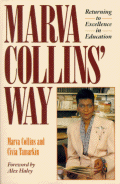***
Q: How did you first discover Ayn Rand?
Collins: I think I’ve always been a reader—I read at least five to six hundred books a year, that’s not a difficult thing. I have read some of everybody.
Q: Do you have any major disagreements with her philosophy?
Collins: No, because I think she has a right to her philosophy. I think that most of what she talks about is compatible. We use it as a textbook here with our third-graders. We’re reading "The Comprachicos" now.
Q: Oh! How do the students react to Ayn Rand?
Collins: Well, that’s why its sad—if you talk to our students they know perhaps more about Ayn Rand than most grown-ups. I think, again, every child here is steeped in self, and doing it for themselves, and leaving no blank spaces and that kind of thing.
Q: Tell us about why and how you got involved in the Westside Prep. Project.
Collins: I started the school twenty-two years ago, in my own home and, of course, when I left there after five years we purchased a building. And I’ve been here since then.
Q: Do you receive any government support for it?
Collins: No ma’am I do not.
Q: Did the government try to send you some support?
Collins: I don’t want anything from the government. Because my people never could have failed so miserably without the government’s help!
[...]
Q: What are some of the similarities and differences between your approach and that of Maria Montessori?
Collins: Maria Montessori started her schools for the poor children in Italy, and certainly that is very anathema to today, because only very wealthy children can go to Montessori. I think Montessori is all out of focus in many of the centers as to what she started the schools to be. You know, I don’t compare my program to anyone. My entire thing is the "I"—all that I can be. I hope that it doesn’t compare to anyone’s—I hope that it’s an original and that it depicts who I am, not who Maria Montessori might have been, or is. Just as I don’t teach children to compare themselves to anyone, I don’t compare my program to anyone else’s.
Q: Do you have any significant disagreements with her Montessori method?
Collins: No, because who am I to disagree with her methods? (Laughter) I am here to make certain I get the point from my own eyes, before I get the splinters from someone else’s.
Q: What is your opinion of John Holt’s books, for example, his How Children Learn?
Collins: Many of the things I agree with, and some of them are not the way I think. But then, that’s his right. Again, I don’t judge on who is wrong, what’s wrong, what’s right. Again, I concentrate in this lifetime on all that I can be—where is it that Marva Collins needs to go? And that’s to make every child a happy child, a lifter of society rather than using excuses—that’s its somebody else’s fault—and to make good choices. Those are the things I concentrate on.
Q: In what ways has your teaching philosophy evolved over the years, if any, and why?
Collins: I hope each day that I’m better in the classroom today than I was yesterday. We have third-graders doing Latin this year. We have a new building that we’re moving into in September, so I think if you stay the same, you certainly aren’t growing. It’s simple as a plant. If the plant stays the same size after four or five years then it’s obvious, unless it’s a dwarf, or it needs transplanting, that it has stopped growing, but you certainly hope there’s going to be growth.
Q: How do you teach conceptual skills to young people? Do you teach logic, for example?
Collins: Well, without logic, nothing happens. You know, we have a thinking skill inventory. The children learn to make choices, they learn to discipline themselves from the principles of Plato’s Republic, and that kind of thing.
Q: When you are teaching vocabulary, how do you teach your students how to formulate proper definitions on their own?
Collins: Our children are doing vocabulary words at three. They are using a book called Vocabulary for the College-Bound Student. We teach the vocabularies, we teach them phonics.
Q: You place some emphasis on the need for memorization, such as memorizing poetry—
Collins: If we don’t memorize, how to we get from step A to step B? You certainly have to memorize where you put your silverware. How many of us have gone berserk because we couldn’t find something that we had hidden from ourselves?
Q: Does memorization aid in understanding?
Collins: Of course. I believe that it aids, because the more you repeat something, the more it becomes axiomatic, the more it becomes automatic.
[...]
Q: How do you communicate the joy of learning?
Collins: First of all, you learn the miracle that you are. And once you learn that then, as Emerson said, once a person learns how to tick, they openly want to learn how to tick better. So no teacher can teach a child all that they need to know. You teach them to learn the joy, the wonder, the miracle, of learning.
Q: Is "Attention Deficit Syndrome" a real clinical phenomenon?
Collins: Attention Deficit is something we’ve given to very wealthy children now because their parents have enough money to pay x dollars an hour to get them straightened out. Attention deficit means boredom. I’m attention deficient myself if the subject does not interest me.
Q: Why is public education failing to teach its pupils adequately?
Collins: Well, it’s not just public education, there are a lot of private schools that are doing a horrible job too. We must keep in mind public debts are very unfair assessments, because the textbooks—the same junk that is used in public schools—are also used in private schools. Without them, the publishing companies would go out of business. Junk used in a rich area is still junk.
Q: Do you have any views as far as reforming education publicly? Should we just privatize all the schools?
Collins: Well, when we privatize them, we’re going to give them to the same "experts" that messed them up in the first place. I think the first thing we need to reform in schools is by overhauling the curriculum.
Q: Do you think that the activists on behalf of "School Choice" are doing a good job explaining their position to the public?
Collins: You know, school choice, charter schools—it’s just you don’t put old wine in new wineskins.
Q: Do you see any dangers associated with government voucher programs for private schools?
Collins: I don’t mind whether its vouchers, whether its charter schools. Our first job is two things—I ask: What is the curriculum and who is teaching it?
Q: Many educators believe it is society’s moral responsibility to pay for the education of its poorest families. Should these families be expected to pay for their children’s schooling?
Collins: Before we get to paying, I think we first need to ask—What am I paying for? I just think very differently about the questions we ask. I don’t think what we’re teaching almost anywhere today is worth getting for free. So I won’t even get to the paying for it. I just don’t agree with that question, because we’re not getting anything right now, so why would we pay for more mediocrity?
|
Marva Nettles Collins
is a native of Alabama and a graduate of Atlanta’s Clark College.
She moved to Chicago in 1959, where she taught in the public school
system for fourteen years. Her experiences in the Chicago public
school system, on top of her dissatisfaction with the quality of
education two of her three children were receiving in private schools,
led to her decision to open her own school on the second floor of
her home. Since those humble beginnings, Collins has garnered international
recognition. She has received numerous prestigious awards as well
as honorary doctoral degrees from several universities, including
Notre Dame, Dartmouth and Amherst College. In 1981, she was the
subject of the made-for-TV movie, The Marva Collins Story,
starring Cicely Tyson and Morgan Freeman. She was profiled on CBS’
60 Minutes in 1975 and again in 1995, the latter episode
chronicling the achievements of Collins’ former students. In
addition to her commitment to her educational programs, Collins
has trained over 30,000 teachers in the use of her methodology and
classroom techniques. Currently, she is acting as external support
partner for three Chicago public schools, directing an academic
improvement program based on her own successful methodology and
curricula. Oklahoma’s expanding "Great Expectations"
program for enhancing public school education is based on Marva
Collins’ teaching philosophy. Her students are excited about
learning, and their scholarly attainment defies the excuse-making
industry which declares that some children—inner city children,
in particular—cannot learn to become scholars and citizens
of the world. |
These excerpts represents a little over 1/3 of the interview with Mrs. Collins and Mr. Griffin. To read the full text, you may order a copy of the June 1997 issue of Full Context here.

 She
is the author of several books, including Marva Collins’
Way (with C. Tamarkin), and Ordinary Children, Extraordinary
Teachers. Her latest book, Values: Lighting the Candle of
Excellence (Dove Audio, 1996) is available in both cassette
and hardcover.
She
is the author of several books, including Marva Collins’
Way (with C. Tamarkin), and Ordinary Children, Extraordinary
Teachers. Her latest book, Values: Lighting the Candle of
Excellence (Dove Audio, 1996) is available in both cassette
and hardcover.